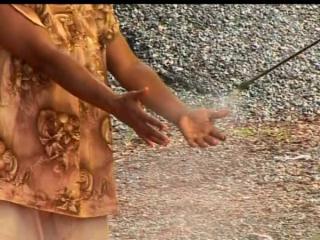CONAKRY, Guinea – Soldiers reeking of alcohol menaced Guinea's capital Tuesday, a day after the military's presidential guard shot at pro-democracy demonstrators in the West African country, leaving at least 100 dead, a doctor said.
The soldiers fired into the air as they roamed the deserted streets of the normally bustling capital. Guinea's military leader, who rose to power in a December coup, said Monday's violence was beyond his control.
An Associated Press reporter said he saw halls full of wounded patients at the city's large Donka Hospital, some with bullet wounds, others who appeared to have been beaten.
A doctor at the hospital, who spoke on condition of anonymity because he is not authorized to speak to media and because he fears for his life, said he had seen more than 100 bodies in the morgue.
Opposition politician Mutarr Diallo said he witnessed soldiers raping women with rifle butts during Monday's protests. He was arrested during the protest but released Tuesday morning.
New York-based Human Rights Watch said eyewitnesses also told them that security forces had stripped female protesters Monday and raped them in the streets. Other eyewitnesses said soldiers had stabbed protesters with knives and bayonets.
Tensions have risen in Guinea amid rumors that military leader Capt. Moussa "Dadis" Camara may run in presidential elections set for Jan. 31. Camara said that the shootings by members of his presidential guard were beyond his control.
"Those people who committed those atrocities were uncontrollable elements in the military," he told Radio France International on Monday night. "Even I, as head of state in this very tense situation, cannot claim to be able to control those elements in the military."
Corinne Dufka, senior West Africa researcher at Human Rights Watch, said the killing of dozens of unarmed protesters is "shocking even by the abusive standards of Guinea's coup government."
"Guinea's leaders should order an immediate end to attacks on demonstrators and bring to justice those responsible for the bloodshed," she said.
The African Union, the European Union and the government of neighboring Senegal all quickly denounced Monday's violence. The AU had suspended Guinea's membership after Camara seized power in a December coup.
The African Union Commission condemned the "indiscriminate firing on unarmed civilians," and urged Guinean officials to respect the freedom of expression and assembly.
EU foreign policy chief Javier Solana called for the immediate release of arrested political leaders.
Opposition leader Sidya Toure, a former prime minister, was arrested during the protests and released Tuesday. When he returned home, he said he found it had been ransacked.
"I have come back to a broken home," he said. "What upsets me most is that they destroyed my library. All my books and souvenirs are gone."
Camara came to power in a coup hours after longtime dictator Lansana Conte died. Camara initially said he would not run in a presidential election set for Jan. 31 but recently said he has the right to run.
The opposition-led protest in the capital's main football stadium Monday drew some 50,000 people, with demonstrators chanting "We want true democracy."
On Aug. 27, police fired tear gas to break up a demonstration in the capital, and last Thursday tens of thousands of residents in a town north of Conakry took to the streets with no serious incidents.
Hardly anyone had heard of Camara, an army captain in his 40s, until Dec. 23, when his men broke down the glass doors of the state TV station. He announced that the constitution had been dissolved and that the country was now under the rule of a military junta.
In the days after the coup, Camara was initially embraced by Guineans, thousands of whom lined the streets to applaud his arrival on the back of a flatbed military truck.
But many began to question his tactics when he authorized raids on the homes of well-known members of Conte's inner circle. Camara claimed the raids were intended to recoup money and property stolen from the state, but some residents complained officials were using heavy-handed tactics.
Since winning independence half a century ago from France, Guinea has been pillaged by its ruling elite. Its 10 million people are among the world's poorest, even though its soil has diamonds, gold, iron and half the world's reserves of the raw material used to make aluminum.





No comments:
Post a Comment